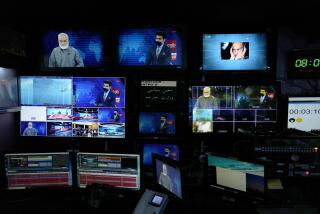Iraq to keep Islam out of polls
- Share via
BAGHDAD — In a move to separate mosque and state, the Iraqi government said Thursday that Islamic houses of worship should be off limits for campaigning in provincial elections scheduled for the fall.
Government spokesman Ali Dabbagh also said that photos of anyone but the candidates would be banned from campaign advertising.
Prime Minister Nouri Maliki’s administration issued the recommendations in the hope of preventing a repetition of the use made of the country’s revered religious figures in the 2005 election campaign.
Shiite Muslim political slates plastered their campaign literature with images of Grand Ayatollah Ali Sistani, Iraq’s most influential religious leader, and some mosques sent out cars with loudspeakers promoting candidates.
Dabbagh announced several other recommendations Thursday, including the use of an open slate that would allow voters to pick individual candidates, rather than vote for entire slates as in 2005.
To deflect concerns that the measure would reduce the chances of women being elected, Dabbagh said, there should be at least one woman in the first three spots on each slate.
The open slate was proposed as an improvement over the unpopular system used in 2005, but it also has critics who say it will be so confusing that the votes won’t be counted properly.
Parliament may try to draft a hybrid when it takes up the election law. However, there appears to be a majority in favor of banning the use of religious images, said Usama Najafi, a lawmaker from the secular Iraqi National List slate headed by former Prime Minister Iyad Allawi.
“Referring to religious symbols in campaigning is against the constitution,” Najafi said. “It is deceiving people that the religious figure supports a given slate, and this is not right.”
Even before the announcement, Iraq’s religious leaders appeared to be voluntarily backing away from the practice. Sistani this week prohibited the use of his name or image by any groups.
A spokesman for anti-U.S. cleric Muqtada Sadr, whose larger-than-life image is routinely posted in heavily Shiite areas, said his group would not use religious imagery. Sadr’s image will not be used in campaigning because “it would decrease the majesty and eminence of such religious symbols,” Salah Ubaidi said.
The Sadr movement isn’t fielding its own slate but will support individuals, said Ghufran Saidi, a pro-Sadr lawmaker.
Dabbagh, the government spokesman, also said Thursday that Jordan’s King Abdullah would soon visit Iraq to meet with Maliki.
Meanwhile, a car bomb went off near Yarmouk Hospital in west Baghdad, killing five people and injuring 10, police said. In Hillah, 60 miles south of Baghdad, a bomb exploded in a cafe late Wednesday, killing four, police said.
--
--
Times staff writer Saif Rasheed in Baghdad and a special correspondent in Najaf contributed to this report.
More to Read
Sign up for Essential California
The most important California stories and recommendations in your inbox every morning.
You may occasionally receive promotional content from the Los Angeles Times.














